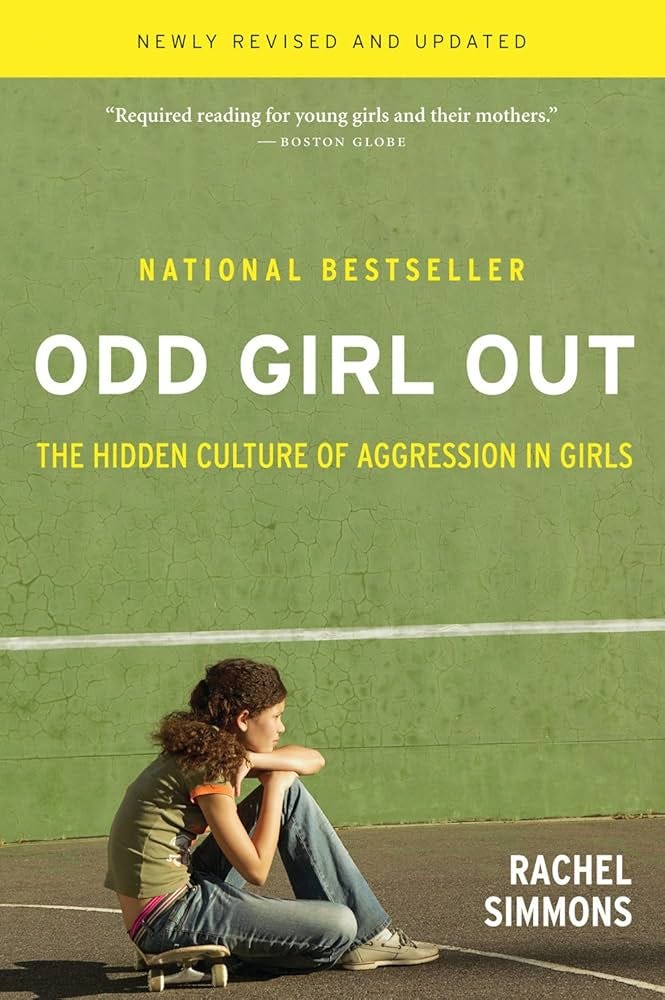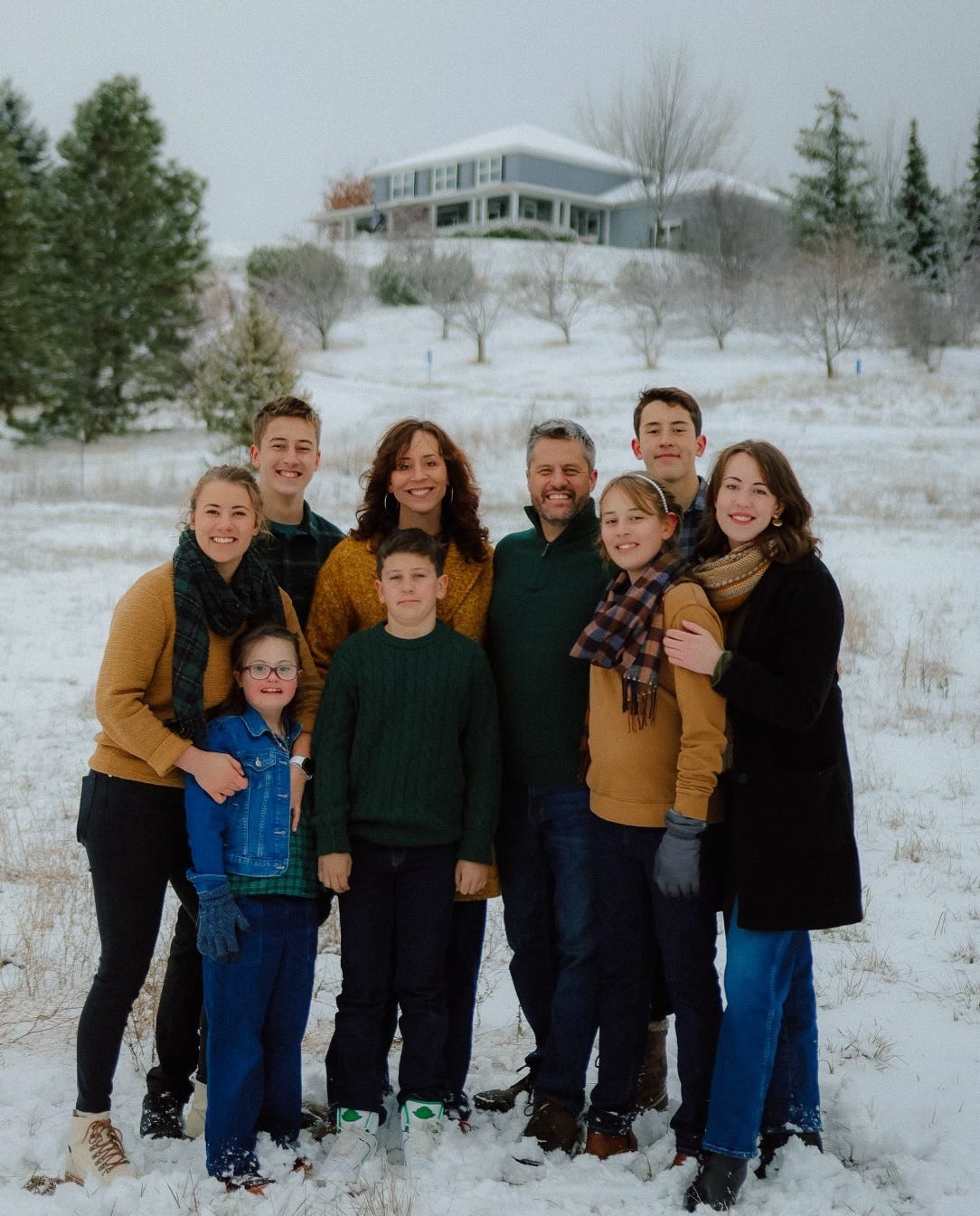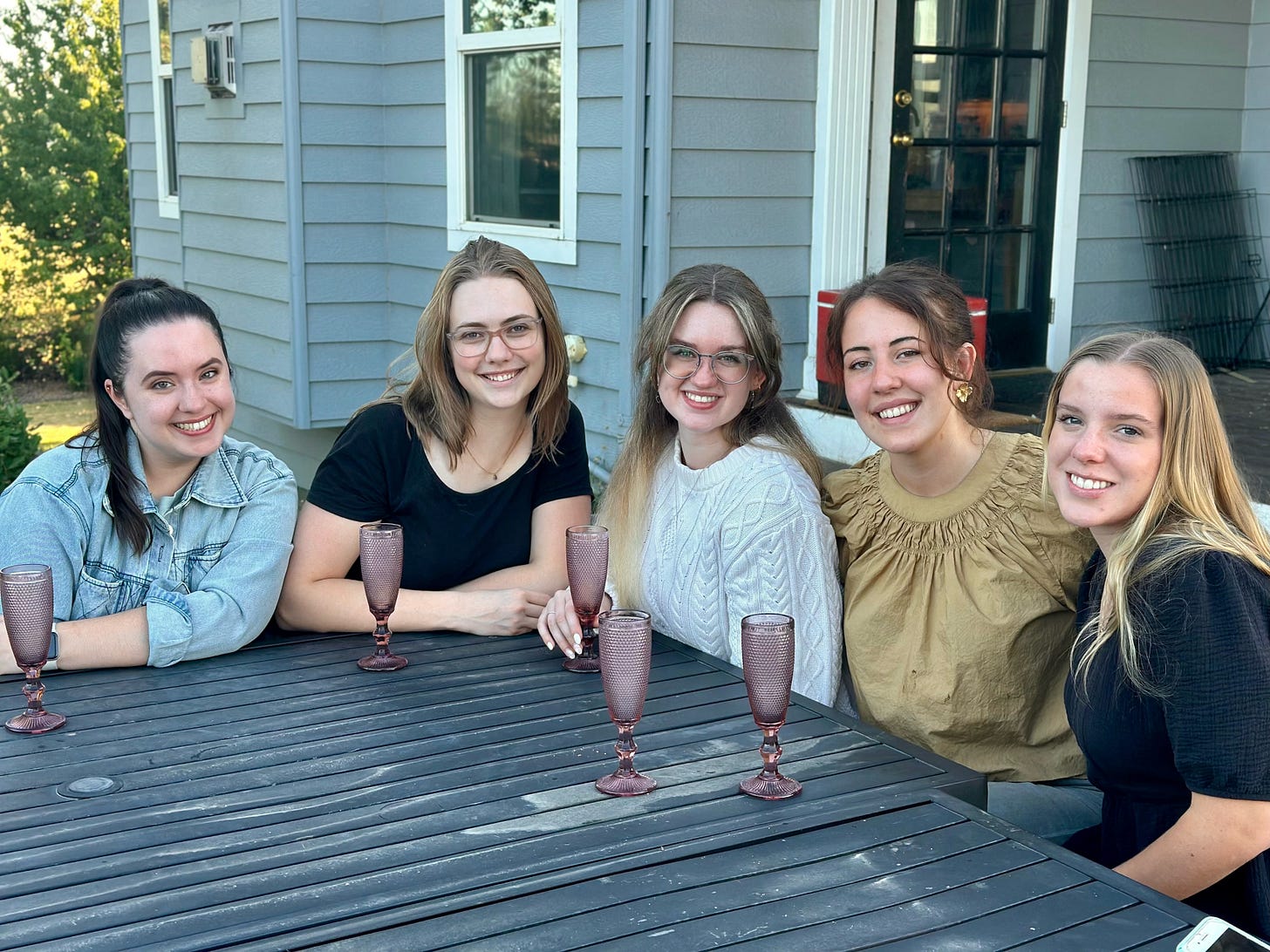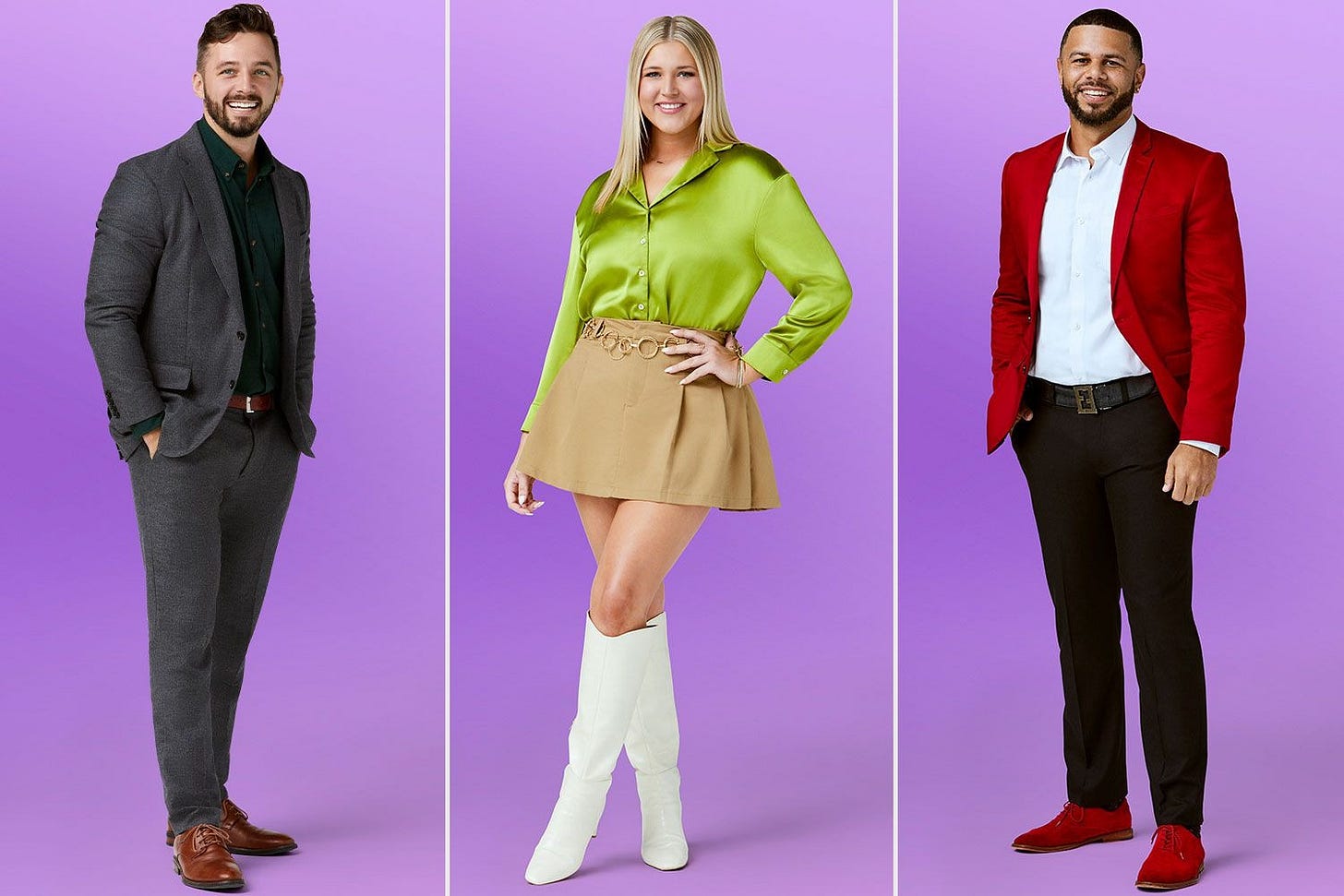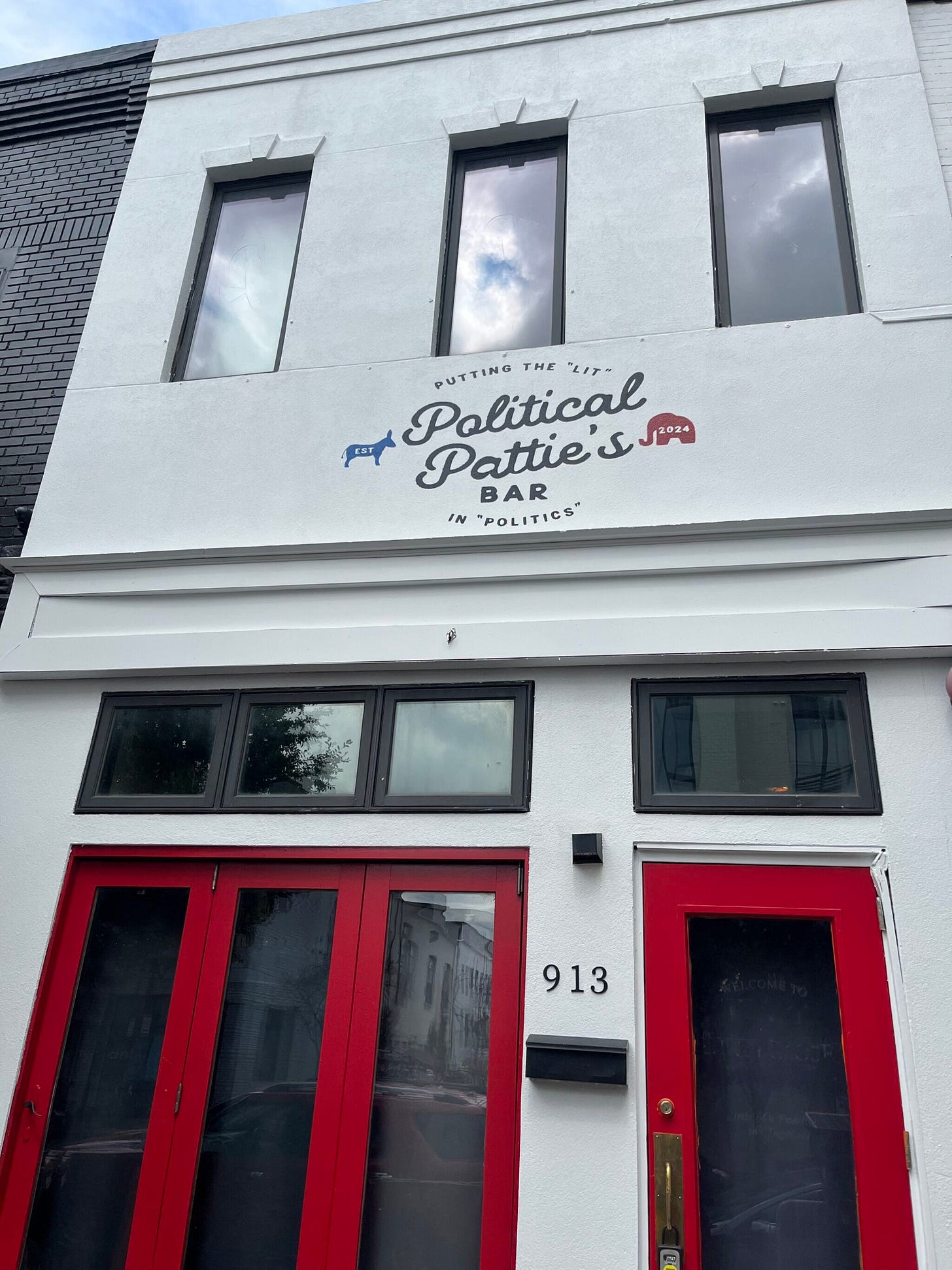The Girl’s Guide is back, baby! And I haven’t gotten a full night’s sleep in weeks, so typos may abound! If you missed the most recent issue, find it here.
Find me on Instagram and Twitter so you don’t miss any of my work.
Allow Me to Reintroduce Myself
I’ve noticed some new subscribers around here recently — so I thought a (re)introduction might be in order!
I started The Girl’s Guide in 2021 as a way to process what I’ve learned about navigating my 20s so far. (I’m 26, so I’ve still got a few years left as a twenty-something.) I also felt like I knew so many amazing women with amazing advice — and I wanted to share that advice with as many people as I could through my newsletter interviews.
A little more about me:
My husband, Nick, and I met at a trivia night with friends in DC.
I’m a native North Carolinian, but please don’t ask me about the Outer Banks. You’ve probably been there more than I have.
My favorite movies are Lost in Translation, Heathers, and It Happened One Night.
I’m a full-time mom to Margot, who’s almost two, and Sawyer, who is almost eight weeks old!
I’ve worked at several local and national news outlets, including Fox News.
I love getting to know The Girl’s Guide readers! You can get in touch by replying to this email.
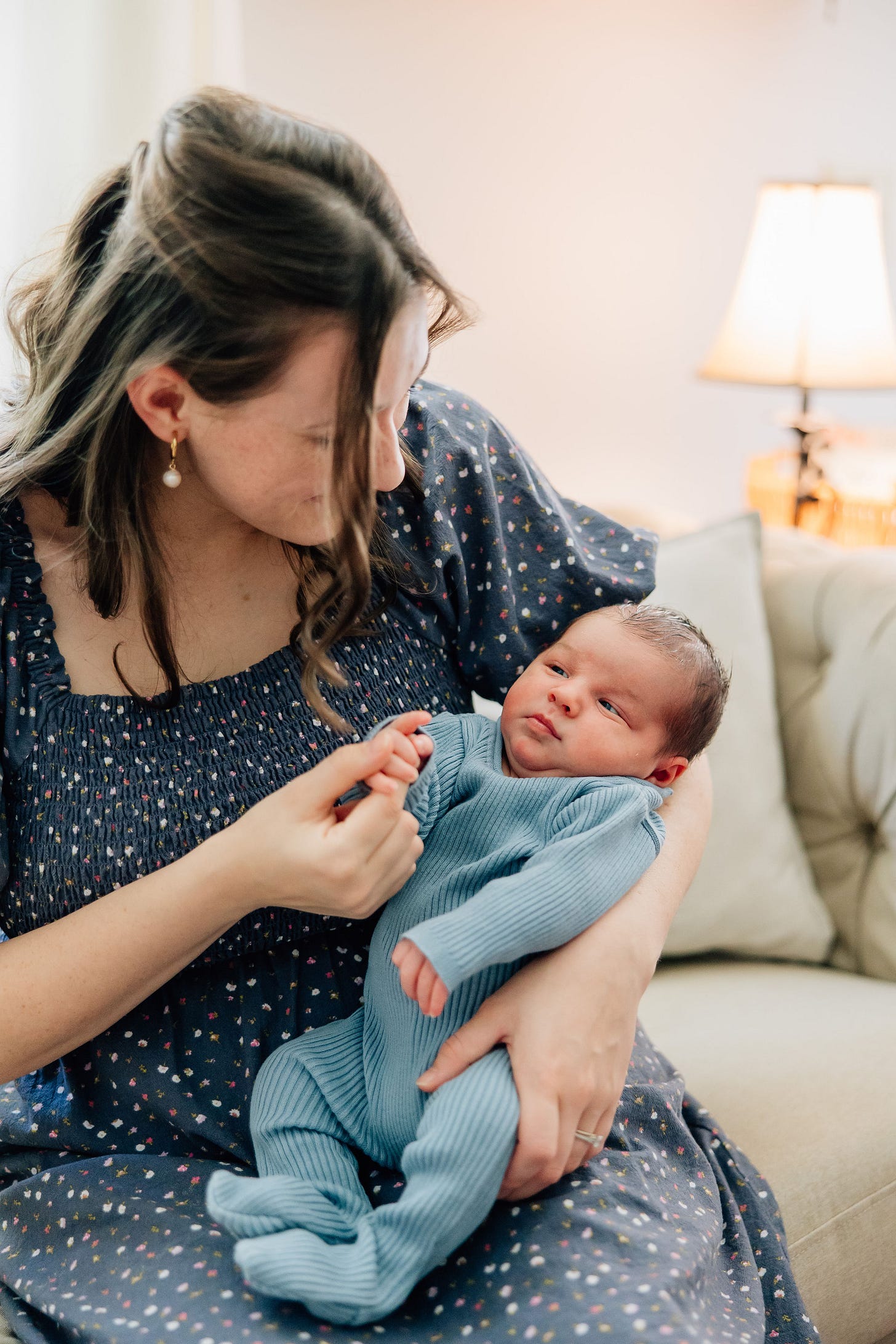
Mean Girls and Lying to Yourself
I always need a good book to keep me awake while I do late-night newborn feedings, and the book I just finished was too good not to share. I’m normally devouring fiction — but this time I really enjoyed some nonfiction in the form of Odd Girl Out: The Hidden Culture of Aggression in Girls by Rachel Simmons. She first published it in 2002, and it made a relatively big splash, so I can’t believe I hadn’t heard of it before. Simmons writes about childhood female bullying — what it is, who experiences it, and possible solutions.
Bullying doesn’t always mean shaking someone down for their lunch money. Simmons details how, for girls, bullying can be done by a friend to a friend. She uses the phrase “relational aggression” to describe how girls control one another by threatening to end a friendship or spreading rumors about one another. It’s an eye-opening read because Simmons is explaining something that virtually every woman experiences — the friendship challenges of middle and high school — but doesn’t have words to describe. Often, the same girls who are belittled turn around and belittle someone else in order to maintain their place in the social hierarchy.
“The salience of relationship in girls' lives makes their practice of imposing isolation worthy of our attention,” Simmons writes. “As we have seen, girls experience isolation as especially terrifying. Since girls earn social capital by their relationships with others, isolation cuts to the core of their identities. For most girls there is little more painful than to stand alone at recess or lunch.”
Reading Odd Girl Out brought back a lot of memories of my preteen and teenage years. I likely missed the worst of girl bullying because I was homeschooled in middle school. I only had to see girls I wasn’t getting along with a few hours a week, not eight hours a day at school. Going back to school in high school was an adjustment, but it wasn’t too long before I made friends.
The main takeaway from the book is that teachers and parents should encourage girls to own what they’re feeling when friends mistreat them — not to blame themselves, or make excuses for their bullies, or lash out at a third party. Instead, a girl who’s being bullied needs to learn to confront her bully and walk away from the relationship if she has to, even if the bully is her best friend.
Unfortunately, we don’t always get to leave high school social dynamics in high school. Although Odd Girl Out focuses on girls under 18, it had some great reminders for spotting mean girl behavior in others — and catching it in yourself as an adult. In a broad sense, the book is about how women and girls lie to themselves so that they don’t have to face hard truths. In interviews with Simmons, women often say they don’t know how they deceived themselves for so long about who was a good friend and who wasn’t. One woman says she doesn’t know why she accepted that a certain friend would always be mean to her in public and nice in private. Another didn’t know why she let more popular girls use her for gossip. And many of the women interviewed regret being bullies, explaining that their justifications seemed sufficient at the time. Simmons seems to blame society for girls’ tendency to lie to themselves, but Jeremiah 17:9 tells us that our hearts are deceitful. We can’t shift the blame for an internal problem outward. And, this side of heaven, we’ll never be completely healed of our girlhood wounds. Odd Girl Out is a great reminder that we can outgrow our teenage patterns, but only if we’re real about the “why” behind our actions.
Interview with Tryn Haney
Today’s interview is Tryn Haney, a graduate of New Saint Andrews College who is back in DC after serving as an American Moment fellow. Connect with Tryn on Twitter and Instagram.
What does your life look like right now?
Lots of transition! As a homegrown PNW girl (Washington and Idaho), I’ve been loving the move from country life to city life on the East Coast. I joined Foundation for American Innovation in September as a Program Associate, so I’m still learning the ropes there as well. Other than that, I’m enjoying all the DC museums and keeping up with F1 races on the weekend.

What’s the biggest lesson you learned during your college years?
One of the biggest lessons I learned is to make friends outside your age group. Some of the best advice has come from people of all ages — whether it’s my mom friends, high school friends, professor friends, or old lady friends. I love my college friends, too, but getting perspective from people in other phases of life can really help you look outside your momentary stresses towards the bigger picture.
How has your style evolved over the last few years?
This year, discovering my Kibbe body type has been a game changer for my style philosophy. While I’ve always dressed for my color season (thanks to my stylish mom!), finding a framework for body shape was exciting. The Kibbe system categorizes individuals based on a mix of physical traits like bone structure and body lines, aiming to help us dress in ways that truly highlight our unique essence. For me, it shed light on why certain trends—like delicate layered jewelry or those baggy, unstructured Pinterest outfits— just never felt right. Figuring out my style identity with Kibbe was tricky (it’s not the most intuitive system), but now I feel so much more confident when shopping and styling pieces. I gravitate toward natural textures (leather, linen, chunky knit) and classic cuts, aiming for waist emphasis in my outfits. I’m trying to balance the East Coast prep with a touch of West Coast boho, always looking for accessories with a little bit of funky flair.
What are your favorite books you read in the last year?
One of my standout reads was Leadership and Emotional Sabotage by Joe Rigney. It was eye-opening in that it explored the internal conflicts that often hold institutions back. Rigney also breaks down the destructive nature of misplaced empathy and how our reactions—or lack thereof—can emotionally charge conflicts. It gave me a lot to think about in navigating my own relationships personally and professionally.
What does your ideal girl’s night in look like?
I love to cook, so this year, I’m challenging myself to host a themed dinner party. I’m planning a cozy night of pasta, drinks, and homemade tiramisu, complete with some handwritten menus and coordinated table settings/decorations.
The Haps
Love Is Blind DC Is Finally Here
The world is getting an inside look at DC dating thanks to Netflix and its mega-successful franchise Love Is Blind. Season 7, which features Washingtonians looking for love, dropped earlier in October. I’ve only watched a little bit of the first episode, but I can already tell there are going to be some CHARACTERS on this season. Of course, Netflix is already getting flak for actually filming in Virginia — read the writeup from Axios here.
DC Couple Tries To Open Bar But Everyone Gets Mad
If only Political Pattie’s were open in time to for Love Is Blind to film there. Kidding! If you don’t live in the DMV, allow me to explain. A husband and wife, who are also black DC natives, just opened a bar in a neighborhood known for DC nightlife. The problem? They named the bar Political Pattie’s and painted a blue donkey and red elephant on the facade. I guess they didn’t realize bipartisanship died a few election cycles ago. Anyway, the Internet went crazy and basically did everything but burn down the bar before it even opened. It’s quite a story — find out what Political Pattie’s is actually like inside here.
Here are more links to what I’m reading and listening to these days:
Freebirth Isn’t Natural (Fairer Disputations): As always,
reframes an important issue with prudence and wisdom at the forefront.The Second Gentleman Is No Gentleman (The Conservateur): Doug Emhoff is taking aim at toxic masculinity, but he needs to look no further than a mirror, writes Emma Foley.
A Pennsylvania for your Thoughts (Moment of Truth): My husband Nick interviews journalist Charles McElwee about what’s happening in the state that could decide the 2024 election.
The Surprising Impact of Short-Term Missions (WGM): My mother-in-law Kelly Solheim has a blog post about why short-term missions teams can have an outsized impact. If you’re interested in missions but don’t know where to start, give it a read!
An Interview with Nandini (The Home Front): What does contemporary American culture get wrong about the role of grandparents in family life?
’s latest interview sheds some light on the question.
Ask Evie
Have a question you want me to answer in the newsletter? Click this link to send your question anonymously!




